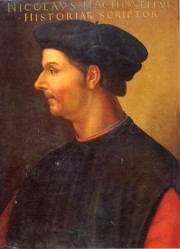|
Home
|
Jan 22, 2024
This week’s themeEponyms This week’s words Machiavellianism Don Quixote thespian epicure Momus 
Niccolo Machiavelli
Art: Cristofano dell’Altissimo (c. 1525-1605) Previous week’s theme Words that have changed A.Word.A.Day
with Anu GargEveryone, even the blandest ones among us, has more than one side to them. However, there are people whose impact on the world, for better or worse, is so profound that it overshadows everything else about them. Their contributions might be in the form of a theory, a work of fiction, a mode of behavior, their role in a historical event, or simply the force of their personality. Such impactful legacies often inspire eponyms, words that are derived from someone’s name. This week, we’re diving into the whimsical world of eponyms, celebrating names that have journeyed from the halls of history and pages of fiction into our everyday vocabulary. What eponyms would you coin after leaders, past or present, in your country? Share below or email us at words@wordsmith.org. Include your location (city, state). Include: Eponym, part of speech: definition, usage example. Machiavellianism
PRONUNCIATION:
MEANING:
noun: The use of unscrupulous means, cunning, and deceit in pursuit of power, especially in politics.
ETYMOLOGY:
After Niccolo Machiavelli (1469-1527), Florentine statesman and author
of The Prince, a political treatise describing the use of craft and deceit
to achieve political power. Earliest documented use: 1607.
USAGE:
“Ms. Merkel rose to power by besting the men around her. She took over
the Christian Democrats by sidelining her mentor, the former Chancellor
Helmut Kohl (who used to call her “mein Mädchen” -- my girl). In 2005,
she beat the macho Chancellor Gerhard Schröder, a man known for
considering women’s emancipation as “Gedöns” -- bric-a-brac.
Ms. Merkel did so by applying her unusual political intelligence as
well as an age-old Machiavellianism.” Anna Sauerbrey; What Do Clinton and Merkel Have in Common?; The New York Times; Oct 31, 2016. A THOUGHT FOR TODAY:
He who is only just is cruel. Who on earth could live were all judged
justly? -Lord Byron, poet (22 Jan 1788-1824)
|
|
Subscriber Services
Awards | Stats | Links | Privacy Policy
Contribute | Advertise
Awards | Stats | Links | Privacy Policy
Contribute | Advertise
© 1994-2025 Wordsmith